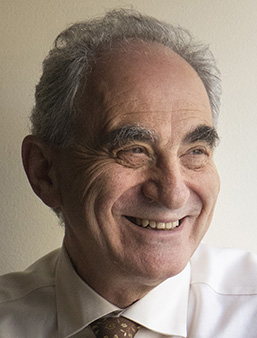Talk Title: “Carbon-negative Technology To Solve the Climate Crisis”
Speaker: Eli Yablonovitch, Professor of Electrical Engineering and Computer Sciences, UC Berkeley
Register To Attend | Watch Livestream on YouTube
Abstract: In 1977, physicist Freeman Dyson proposed the burial of biomass as a scalable, economical solution to the carbon dioxide problem. Today we know that harvested vegetation should be buried in an engineered dry biolandfill. Plant biomass can be preserved for thousands of years by burial in a dry environment with sufficiently low thermodynamic “water activity,” which is the relative humidity in equilibrium with the biomass. A water activity less than 60 percent will not support life, suppressing anaerobic organisms, thus preserving the biomass for millennia. Current agriculture and biolandfill costs indicate that $60 per ton of sequestered carbon dioxide corresponds to $0.53 per gallon of gasoline. If scaled to the level of a major crop, existing carbon dioxide can be extracted from the atmosphere and sequester a significant fraction of prior years’ carbon dioxide emissions.
 Speaker Bio: Eli Yablonovitch introduced the idea that strained semiconductor lasers could have superior performance due to reduced valence band effective mass. Now, with optical telecommunication, almost every human interaction on the internet occurs by strained semiconductor lasers. Yablonovitch is regarded as a father of the photonic bandgap concept, and he coined the term “photonic crystal.” The geometrical structure of the first experimentally realized photonic bandgap is sometimes called “Yablonovite.” In his photovoltaic research, Yablonovitch introduced the 4 (n squared) light-trapping factor, known as the “Yablonovitch limit,” that is in worldwide use for almost all commercial solar panels. He was elected to the National Academy of Engineering, the National Academy of Sciences, the National Academy of Inventors, the American Academy of Arts and Sciences, and as a foreign member, the Royal Society of the United Kingdom.
Speaker Bio: Eli Yablonovitch introduced the idea that strained semiconductor lasers could have superior performance due to reduced valence band effective mass. Now, with optical telecommunication, almost every human interaction on the internet occurs by strained semiconductor lasers. Yablonovitch is regarded as a father of the photonic bandgap concept, and he coined the term “photonic crystal.” The geometrical structure of the first experimentally realized photonic bandgap is sometimes called “Yablonovite.” In his photovoltaic research, Yablonovitch introduced the 4 (n squared) light-trapping factor, known as the “Yablonovitch limit,” that is in worldwide use for almost all commercial solar panels. He was elected to the National Academy of Engineering, the National Academy of Sciences, the National Academy of Inventors, the American Academy of Arts and Sciences, and as a foreign member, the Royal Society of the United Kingdom.
About the Series: CITRIS Research Exchange delivers fresh perspectives on information technology and society from distinguished academic, industry and civic leaders. Free and open to the public, these seminars feature leading voices on societal-scale research issues. Presentations take place on Wednesdays from noon to 1 p.m. PT. Have an idea for a great talk? Please feel free to suggest potential speakers for our series.
Sign up to receive the latest news and updates from CITRIS.

